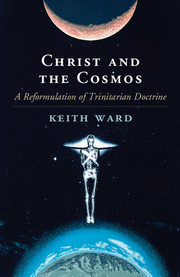Book contents
- Frontmatter
- Contents
- Preface
- Acknowledgements
- PART I THE THREEFOLD NATURE OF THE DIVINE BEING
- PART II THE BIBLICAL SOURCES OF TRINITARIAN THOUGHT
- PART III THE TRINITY, IMMANENT AND ECONOMIC
- PART IV THE SOCIAL TRINITY
- 22 Persons and Substances
- 23 The Idea of a Personal and Free Creation
- 24 The Logical Uniqueness of Persons
- 25 The Divine Nature and Freedom
- 26 Freedom in God and in Creatures
- 27 Persons as Necessarily Relational
- 28 An Ontology of the Personal?
- 29 Intra-Trinitarian Love
- 30 Infinite Gods
- 31 Divine Love and Necessity
- 32 Love and Alterity
- 33 Trinity versus Monotheism
- 34 The Passion of Christ
- 35 God and Abandonment
- PART V THE COSMIC TRINITY
- Bibliography
- Subject Index
- Name Index
29 - Intra-Trinitarian Love
from PART IV - THE SOCIAL TRINITY
Published online by Cambridge University Press: 05 September 2015
- Frontmatter
- Contents
- Preface
- Acknowledgements
- PART I THE THREEFOLD NATURE OF THE DIVINE BEING
- PART II THE BIBLICAL SOURCES OF TRINITARIAN THOUGHT
- PART III THE TRINITY, IMMANENT AND ECONOMIC
- PART IV THE SOCIAL TRINITY
- 22 Persons and Substances
- 23 The Idea of a Personal and Free Creation
- 24 The Logical Uniqueness of Persons
- 25 The Divine Nature and Freedom
- 26 Freedom in God and in Creatures
- 27 Persons as Necessarily Relational
- 28 An Ontology of the Personal?
- 29 Intra-Trinitarian Love
- 30 Infinite Gods
- 31 Divine Love and Necessity
- 32 Love and Alterity
- 33 Trinity versus Monotheism
- 34 The Passion of Christ
- 35 God and Abandonment
- PART V THE COSMIC TRINITY
- Bibliography
- Subject Index
- Name Index
Summary
The most powerful speculative argument for a three-consciousness view of the Trinity probably lies in the consideration that ‘God is love’ (1 John, 4, 8). The argument is that if God is essentially loving, then there must be someone for God to love. Richard Swinburne defines love partly as ‘giving to the other what of one's own is good for him’ (Swinburne, 1994, p. 177). God is omniscient and omnipotent, and if God is to give fully what is God's own, then God must create another omniscient, omnipotent being. There is a question about whether an omnipotent being can create another omnipotent being. Obviously not if ‘omnipotence’ means, or entails, that one has complete power over every other being so that one can create or destroy it at will. If God exists necessarily (that is, God exists whatever else may or may not exist and could not possibly fail to exist), then it may seem that no created being exists necessarily, since it could not exist without its creator. It may be, however, that God necessarily creates another being which, given the existence of God, could not fail to exist. That would entail that God could not destroy it. Yet their relation would be asymmetric, because God would be the cause of the created being, and it could not be the cause of God. The created being would be wholly dependent on the creating being, since the creator has given what is ‘its own’ to the created. The created being receives its power and knowledge from the uncreated being and could not ever oppose it or know anything that it did not know. This would not be an instance of mutual causation, so they would not be omnipotent in quite the same sense.
If these two beings acted, either one would have to make all the decisions and the other would have to agree, or there would have to be some mechanism which compelled them to agree in all decisions. Thus at least one of them would act under compulsion.
- Type
- Chapter
- Information
- Christ and the CosmosA Reformulation of Trinitarian Doctrine, pp. 184 - 187Publisher: Cambridge University PressPrint publication year: 2015



